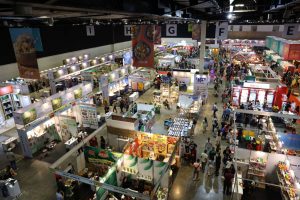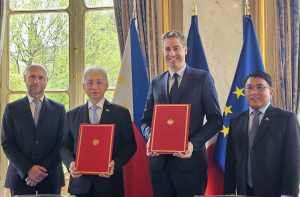DAVAO CITY — During the meeting of some Interagency Task Force for the Management of Emerging Infectious Disease (IATF-EID) Cabinet officials with President Rodrigo Duterte on Monday, 10 August, in Davao City, Trade Secretary Ramon Lopez presented the Department of Trade and Industry (DTI)’s additional response in the fight against COVID-19 pandemic.
“We reported to the President that the Philippines now has the capacity to locally manufacture high quality medical-grade PPE, including N95 and N88 surgical masks. When the COVID-19 pandemic started in February, the country had no local manufacturing of PPE, except for one exporter from Bataan,” Sec. Lopez said.
He added: “Similar to situations in war, the DTI and the Board of Investments (BOI) encouraged local manufacturers to repurpose some of their manufacturing capacity into the production of critical weapons to fight the war against COVID-19, such as PPE and face masks, so that the country can lessen its reliance from imports. At the start of the pandemic, sourcing even from other countries became difficult as other countries prioritized their internal needs for masks and PPE. Thus, it became necessary to produce at least for our country’s internal requirement and be self-reliant on strategic and critical medical products.”
The trade chief also explained that DTI works closely with local manufacturers from Confederation of Wearable Exporters of the Philippines (CONWEP), which started to switch their capacity and even bought new production lines to be able to produce high quality medical-grade PPE that passed the DOH FDA standards.
“More manufacturers such as Reliance, MedTecs, EMS, Tacca, and Luen Thai, eventually started and expanded their production capacity. And they now formed a new alliance called the Confederation of Philippine Manufacturers of PPE (CPMP) in the repurposing of manufacturing facilities to produce personal protective equipment,” Sec. Lopez.
He added: “This initiative among our local manufacturers is a Zero to Hero story, as it shows the true essence of Filipino bayanihan as we started from zero production of PPE to what is now a heroic feat of 57.6 million face masks and 3 million coveralls capacity per month.”
During the meeting, the Trade Secretary stressed the need for the government to patronize locally produced PPE which are standard compliant and more competitive in pricing.
More importantly, he emphasized that the repurposing program led to new investments of USD 35 million and saved 7,450 jobs which were supposed to be laid off due to the weakening of the global economy.
“We are able to save jobs every time the country buys local products. If we buy imported products, we save the jobs in other countries.” Sec. Lopez said.
“In keeping with the whole-of-nation approach, President Duterte directed the Department of Budget and Management (DBM) to prioritize buying from local producers, especially as the prices are competitive and the quality is of high-standard,” he added.
Likewise, the trade chief also reported to the President that the Small Business Corporation (SB Corp.) has already approved over Php 500 million worth of soft loans to over 9,000 heavily affected micro, small, and medium enterprises (MSMEs).
He stressed, however, that the Php 1-billion allotted budget for the micro-financing institution will not be able to assist all requests as they have already received with over Php3.5 billion worth of applications.
Sec. Lopez reported that Senator Christopher “Bong” Go committed to assist DTI in pushing for additional funds for SB Corp.
“As we recognize the significance of helping our MSMEs bounce back during this pandemic, we are in full support of the President’s call to fast track the approval of Bayanihan II, or Bayanihan to Recover As One Act, in order to assist many of our businesses,” the trade chief said.
Lastly, Sec. Lopez also announced that President Duterte approved the DTI and Department of Labor and Employment (DOLE)’s supplemental guidelines on the workplace prevention and control of COVID-19, which are in line with the Department of Health’s guidelines. ♦
Date of Release: 12 August 2020






